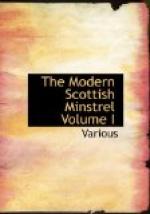Oh, marked we, Death! thy
teachings true,
What dust of time
would blind?
Such thy impartiality
To our highest,
lowest kind.
Thy look is upwards, downwards
shot,
Determined none
to miss;
It rose to Pelham’s
princely bower,
It sinks to shed
like this!
Oh,
long, long, &c.!
So great thy victims, that
the noble
Stand humbled
by the bier;
So poor, it shames the poorest
To grace them
with a tear.
Between the minister of state
And him that grovels
there,
Should one remain uncounselled,
Is there one whom
dool shall spare?
Oh,
long, long, &c.!
The hail that strews the battle-field
Not louder sounds
its call,
Than the falling thousands
round us
Are voicing words
to all.
Hearken! least of all the
nameless;
Evan’s hour
is going fast;
Hearken! greatest of earth’s
great ones—
Princely Pelham’s
hour is past.
Oh,
long, long, &c.!
Friends of my heart! in the
twain we see
A type of life’s
declining;
’Tis like the lantern’s
dripping light,
At either end
a-dwining.
Where was there one more low
than thou—
Thou least of
meanest things?[101]
And where than his was higher
place
Except the throne
of kings?
Oh,
long, long, &c.!
[101] At this humiliating apostrophe, the beggar is reported to have instinctively raised his staff—an action which the bard observed just in time to avoid its descent on his back.
DOUGAL BUCHANAN.
Dougal Buchanan was born at the Mill of Ardoch, in the beautiful valley of Strathyre, and parish of Balquhidder, in the year 1716. His parents were in circumstances to allow him the education of the parish school; on which, by private application, he so far improved, as to be qualified to act as teacher and catechist to the Highland locality which borders on Loch Rannoch, under the appointment of the Society for Propagating Christian Knowledge. Never, it is believed, were the duties of a calling discharged with more zeal and efficiency. The catechist was, both in and out of the strict department of his office, a universal oracle,[102] and his name is revered in the scene of his usefulness in a degree to which the honours of canonization could scarcely have added. Pious, to the height of a proverbial model, he was withal frank, cheerful, and social; and from his extraordinary command of the Gaelic idiom, and its poetic phraseology, he must have lent an ear to many a song and many a legend[103]—a nourishment of the imagination in which, as well as in purity of Gaelic, his native Balquhidder was immeasurably inferior to the Rannoch district of his adoption.
The composition of hymns, embracing a most eloquent and musical paraphrase of many of the more striking inspirations of scriptural poetry, seems to have been the favourite employment of his leisure hours. These are sung or recited in every cottage of the Highlands where a reader or a retentive memory is to be found.




